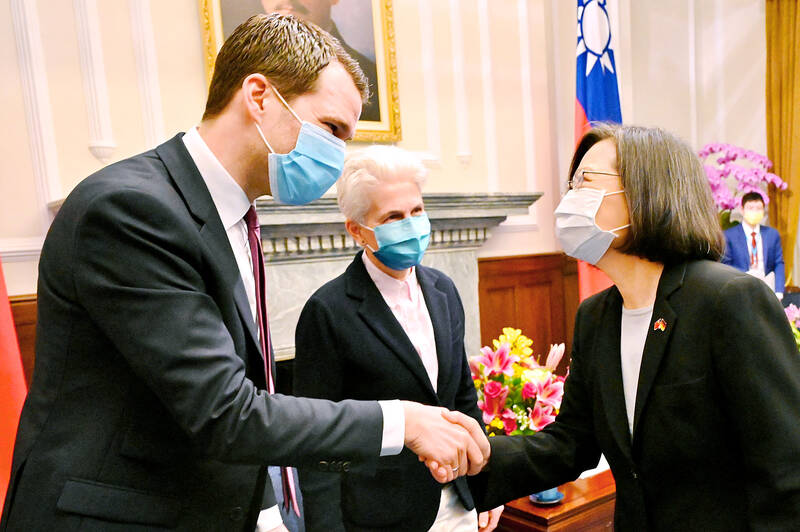Any attempt or threat to change the “status quo” in the Taiwan Strait by force is “unacceptable,” a visiting delegation of German Free Democratic Party (FDP) lawmakers from the Bundestag committees on defense, foreign affairs and human rights said yesterday in Taipei.
“The German Bundestag, the German government as well as European and all Western allies support the ‘one China’ policy, but we also believe that any change of the status quo in the Taiwan Strait can only be achieved by mutual agreement and any attempt to change the status quo by force, or any threat to do it by force, is unacceptable. That is the position of the international community, as laid out in the latest G7 statement, and it is our deep belief as well,” FDP deputy leader Johannes Vogel said when meeting with President Tsai Ing-wen (蔡英文) at the Presidential Office.
“As the Free Democratic Party Parliamentary Group, we take matters of freedom especially to heart. Our visit here is also a gesture of support and solidarity against any threat of military aggression,” he said.

Photo: Sam Yeh, AFP
The 10-member delegation arrived on Monday for a four-day visit, the second group to visit from the Bundestag in three months. German Minister for Education and Research Bettina Stark-Watzinger, who is also of the FDP, is scheduled to visit Taiwan later this year, which would be the first official visit by a German Cabinet member in 26 years.
China on Sunday announced that it would conduct military exercises around Taiwan from 6am on Sunday to 6am on Monday. Fifty-seven People’s Liberation Army aircraft and four navy vessels were detected around Taiwan as of 6am on Monday, the Ministry of National Defense said, adding that 28 had crossed the median line of the Taiwan Strait.
German Bundestag Defense Committee Chairwoman Marie-Agnes Strack-Zimmerman said the world changed when Russia invaded Ukraine on Feb. 24 last year.
The invasion was a huge wake-up call not only for Europe and for Germany, but also for the whole world, she said.
Tsai said that exchanges between Taiwan and Germany in various fields have grown closer.
In October last year, a delegation of members of the German-Taiwan parliamentary friendship group and the committee on human rights and humanitarian aid visited Taiwan, highlighting cross-party support for Taiwan in the Bundestag, she said.
National Human Rights Commission Chairwoman Chen Chu (陳菊) reciprocated by leading a delegation to Germany, the highest-level meeting of human rights officials from both sides, she added.
The Bundestag last year also passed a resolution supporting Taiwan’s participation in the World Health Assembly as an observer. It was the first time that more than 100 Bundestag lawmakers signed a petition in favor of Taiwan, Tsai said.
When China conducted prolonged military exercises near the Taiwan Strait, Germany, which then held the G7 presidency, expressed the importance of maintaining peace across the Strait in a joint statement by G7 foreign ministers, she said.
“Starting next year, Taiwan’s mandatory military service will be extended to one year. This will bolster our defense capabilities, and demonstrate our determination to defend our homeland and safeguard democracy,” she added.

US President Donald Trump yesterday announced sweeping "reciprocal tariffs" on US trading partners, including a 32 percent tax on goods from Taiwan that is set to take effect on Wednesday. At a Rose Garden event, Trump declared a 10 percent baseline tax on imports from all countries, with the White House saying it would take effect on Saturday. Countries with larger trade surpluses with the US would face higher duties beginning on Wednesday, including Taiwan (32 percent), China (34 percent), Japan (24 percent), South Korea (25 percent), Vietnam (46 percent) and Thailand (36 percent). Canada and Mexico, the two largest US trading

AIR SUPPORT: The Ministry of National Defense thanked the US for the delivery, adding that it was an indicator of the White House’s commitment to the Taiwan Relations Act Deputy Minister of National Defense Po Horng-huei (柏鴻輝) and Representative to the US Alexander Yui on Friday attended a delivery ceremony for the first of Taiwan’s long-awaited 66 F-16C/D Block 70 jets at a Lockheed Martin Corp factory in Greenville, South Carolina. “We are so proud to be the global home of the F-16 and to support Taiwan’s air defense capabilities,” US Representative William Timmons wrote on X, alongside a photograph of Taiwanese and US officials at the event. The F-16C/D Block 70 jets Taiwan ordered have the same capabilities as aircraft that had been upgraded to F-16Vs. The batch of Lockheed Martin

GRIDLOCK: The National Fire Agency’s Special Search and Rescue team is on standby to travel to the countries to help out with the rescue effort A powerful earthquake rocked Myanmar and neighboring Thailand yesterday, killing at least three people in Bangkok and burying dozens when a high-rise building under construction collapsed. Footage shared on social media from Myanmar’s second-largest city showed widespread destruction, raising fears that many were trapped under the rubble or killed. The magnitude 7.7 earthquake, with an epicenter near Mandalay in Myanmar, struck at midday and was followed by a strong magnitude 6.4 aftershock. The extent of death, injury and destruction — especially in Myanmar, which is embroiled in a civil war and where information is tightly controlled at the best of times —

China's military today said it began joint army, navy and rocket force exercises around Taiwan to "serve as a stern warning and powerful deterrent against Taiwanese independence," calling President William Lai (賴清德) a "parasite." The exercises come after Lai called Beijing a "foreign hostile force" last month. More than 10 Chinese military ships approached close to Taiwan's 24 nautical mile (44.4km) contiguous zone this morning and Taiwan sent its own warships to respond, two senior Taiwanese officials said. Taiwan has not yet detected any live fire by the Chinese military so far, one of the officials said. The drills took place after US Secretary